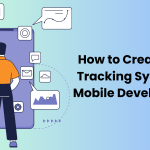Imagine a digital world, where your connections with customers move to phenomenal levels! Today’s modern business world progresses when there are solid and sustainable customer connections. For this purpose, the Customer Relationship Management, also abbreviated as CRM software is used.
CRM trends are on a continuous go of development and evolution. A Customer Relationship Management system is a basic tool for the teams of sales and marketing departments. However, to take advantage of their CRM, in the event that you’re on the lookout for one, you should know about new and developing CRM patterns.
CRM helps with multiple issues related to business, including management of customer communication service to developing and improving marketing endeavors. Monitoring the most well-known CRM programming patterns might assist you with remaining in front of your opposition.

This article will tell you about the CRM software developments trends in 2024, that can provide a better way as a CRM development company to shape customer relations. Let’s jump right into the in-depth details.
Reasons Why Companies are Using CRM Software Development
Customer Relationship Management software is the most fast and widest growing digital justified advertisement. There is a great deal of proof on how CRM Software can help companies of each and every size develop and meet their objectives. How about we look at current realities:
- CRM software company can further develop transformation rates by 300%
- There are around 13% of companies that prioritize investment in CRM platforms, as one of the top sales priorities.
- CRM Software development provides some increases. 27% of increase for client maintenance and further develop client connections by 74%
- By 2025, the CRM market will be valued at $82 billion universally.
- 91% of organizations with more than 11 representatives currently use CRM Deals gauging and report precision can increment by 42% with CRM programming Organizations can utilize a CRM to reduce lead expenses by 23%
Top Trends of CRM Software Development
1: Rising Interest for Artificial Intelligence Driven CRM Solutions:
In the consistently extending advanced scene, the interest for computer-based intelligence driven CRM arrangements has arrived at uncommon levels. Organizations are perceiving the force of coordinating digitized reasoning to acquire further client experiences and smooth out processes through mechanization. Tackling the capacities of AI, CRM designers are preparing for a more natural and proficient customer relationship with the executives framework.
2: Blockchain Integration in CRM:
Information security is a foremost concern for a CRM development company, and blockchain innovation is upsetting the way that organizations approach it. By guaranteeing straightforwardness in client connections and decentralizing CRM stages, blockchain combination is reshaping the scene, offering uplifted security and confidence during a time of expanding information concerns.

3: The Impact of Voice Innovation:
Voice-initiated CRM frameworks are acquiring noticeable quality, offering a sans hands and effective method for connecting with customer information. From basic voice orders to complex questions, the combination of voice innovation improves client experience, advances openness, and encourages inclusivity in CRM stages.
4: Edge Computing in CRM:
The shift towards edge registering is changing CRM advancement by bringing information handling nearer to the source. This diminishes idleness, further develops constant examination, and upgrades the general exhibition and versatility of CRM frameworks. CRM engineers are currently focusing on figuring out the needs of a consistently associated world.
5: The Proliferation of IoT Devices:
IoT devices will continue to play a significant role in determining CRM software trends in 2024 and beyond. IoT refers to a collective web of connective devices and technology. Billions of devices connect by means of technology and communicate with other devices as well as the cloud.
CRM systems integrated with IoT technology may automatically generate a support ticket for your staff to respond to as quickly as possible, offer insights into customer behavior, and proactively identify product bottlenecks before a customer does. All in all, the rising IoT devices will continue helping businesses gain deeper insights into customer relationships, interactions and other CRM trends. The ample amount of data enables targeted advertising campaigns, sales forecasting using predictive analytics, and helpful customer support relationships.
6: Mobile CRM:
Nowadays, we can access everything in the palm of our hands. This has given rise to mobile CRM apps that users can download on mobile devices such as smartphones, tablets etc. Mobile CRM allows sales representatives to quickly access customer data anytime anywhere and deliver better value to their customers.
7: Hyper-Personalization within CRM:
Personalization has been a cornerstone in building trustworthy customer relationships. In 2024 and years ahead, businesses will have to shift their focus on hyper-personalization if they want to step up their reputation and revenue game. Some of the best practices of hyper-personalization are a two-way tailored customer communication, providing memorable onboarding experience, personalized product/service recommendations and follow ups.
8: The Evolution of Social CRM:
With social media data making important customer insights available to enterprises, social CRM is the most anticipated customer relationship management trend in the CRM sector. According to recent research, social media data analysis can now quantify brand reputation, identify profitable brand alliances, and identify evolving market structures in ways that were before impractical.
As a result, the best CRM platforms will become social CRMs rather than just social media connectors. In order to improve customer relationships, social media sales and service procedures will be incorporated into all phases of the customers’ journey, the sales funnel, relationship development, and customer service.
9: The Integration of Business Process Automation (BPA):
Data is essential for businesses to grow, assemble, and develop. However, because there are many different data kinds and sources, the data that businesses use is frequently unstructured. Businesses are increasingly choosing to integrate Business Process Automation (BPA) with unstructured data in order to increase data accessibility. Companies are realizing that data silos cause their current data assets to become unavailable, useless, and nonintegrable. Therefore, in order to increase data accessibility and take full advantage of its potential, they are turning to BPA with unstructured data.
Businesses can improve customer service, streamline procedures, and achieve business objectives with this degree of integration. As a result, this gives organizations a better framework, which promotes improved decision-making and efficient business procedures.
10: Omnichannel Experience:
In the modern landscape, companies cannot survive and thrive merely on the basis of their products or services. Customers expect cohesive communication and presence across all social media platforms. CRM software helps deliver an omnichannel customer experience across all platforms including, social media platforms, in-person or within the mobile app.
To provide a consistent brand experience across all touchpoints, you should make sure that customer data and interactions are consistent. When you regularly update your CRM system, think about the best ways to combine all of your customer interactions into a single profile. By doing this, you can provide both current and potential clients consistent service and marketing messaging. Personalized marketing advice based on past consumer behavior or targeted mailings based on past purchases are two examples of this.
Businesses can improve customer service, streamline procedures, and achieve business objectives with this degree of integration. As a result, this gives organizations a better framework, which promotes improved decision-making and efficient business processes.
11: The Explosion of Channel-Less CRM:
A channel-less CRM approach places less emphasis on communication channels as compared to omnichannel CRM. Your consumers are at the heart of all CRM procedures under a channel-less CRM strategy. CRM technologies are anticipated to use AI to provide more thorough customer data collection in order to enable this.
12: The Industry-Specific CRM Software:
Various enterprises have particular requirements. Sales personnel may require different tools to accomplish their work, even if all organizations may need to do comparable tasks, such as prospecting or customer communications.
As a result, industry-specific software has become one of the newest trends in CRM. Companies with a deeper awareness of particular procedures, rules, and legal requirements, such as healthcare organizations, have started to transition to software created with insider knowledge. By offering features that are especially pertinent to their daily work, this specialized software assists businesses in streamlining their operations, increasing productivity, and improving efficiency.

Best practices and compliance measures are frequently integrated into industry-specific software, assisting businesses in making sure they can readily adhere to legal and industry standards.
13: Self-Service CRM:
CRM trends for 2024 show a growing trend towards self-service portal integration with CRM software. In the past, setting up and maintaining the majority of company management systems required IT support due to their complexity and cost. Self-service CRMs, however, are altering the story. These software solutions, which are either low-code or no-code, are made to be simple to use and require little to no technical assistance.
This lowers their cost and increases their accessibility for small enterprises. Furthermore, self-service CRMs are simpler to start up and grow because they are frequently cloud-based. Because of this, self-service CRMs are quickly gaining popularity in the business management sector, particularly with the growth of freelancers and solopreneurs that has occurred since the pandemic.
Simple CRMs are perfect for small firms and solopreneurs because they are frequently easier to use than their more complicated competitors. For individuals who lack the time or means to invest in a sophisticated system, these systems are ideal as they are reasonably priced.
Conclusion
As we move forward in 2024 and beyond, we anticipate a world of innovation, creativity and automation in the realm of Customer Relationship Management. The day is not far away when we could experience a 180 degree transformation of customer relationship management; building trust, loyalty, communication, and customer satisfaction.
Better customer experiences are promised by the expanding field of CRM, which is driven by a greater comprehension of consumer behavior, seamless integration of cutting-edge technologies, and an unwavering focus on privacy and data protection.
The evolving landscape of CRM demands refreshing future prospects, opportunities and challenges. Businesses which can adapt, innovate, and put their customers’ needs first will be the ones who shape customer relationships in the future.
If you’ve a pressing need for a CRM software or a project in the pipeline, hit us up and we’d be happy to discuss your tailored requirements and bring together results that you’ll absolutely love! Click here to contact us.
FAQs
1: What are the key trends driving the evolution of CRM software in 2024 and beyond?
The key trends include the integration of AI and machine learning for advanced analytics, the rise of omnichannel customer engagement, increased emphasis on personalization through data-driven insights, the adoption of cloud-based CRM solutions for scalability and flexibility, and a focus on enhancing customer experience through automation and predictive analytics.
2: How do AI and machine learning impact CRM software in 2024?
AI and machine learning are revolutionizing CRM by enabling predictive analytics, automating routine tasks, providing deeper customer insights, and enhancing decision-making processes. These technologies empower businesses to anticipate customer needs, personalize interactions, and streamline operations for improved efficiency and effectiveness.
3: How has CRM developed from its early stages?
In its early stages, CRM primarily focused on managing customer interactions and maintaining databases of customer information. Over time, CRM has evolved into a comprehensive strategy and technology ecosystem that encompasses customer engagement across multiple channels, data-driven insights for personalized interactions, automation of repetitive tasks, integration with other business systems, and predictive analytics for anticipating customer needs.
4: How does personalization contribute to effective CRM strategies?
Personalization allows businesses to tailor products, services, and communications to individual customer preferences and behavior. By leveraging data analytics and AI-driven insights, organizations can deliver targeted marketing messages, product recommendations, and customer service experiences, fostering stronger relationships, loyalty, and satisfaction.
5: What are the most-anticipated CRM software trends that we can witness in 2024 and beyond?
The key trends include the proliferation of IoT devices, the rising trend of AI and ML in SRM solutions, edge computing, mobile and social CRMs and the integration of blockchain technology solutions with CRM software.




